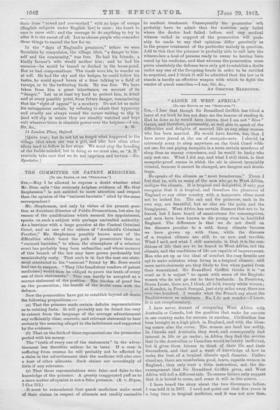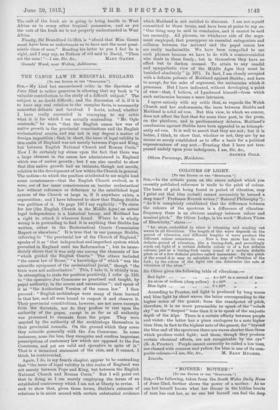"ALONE IN WEST AFRICA."
[TO THE EDITOR OF THE "SPECTATOR."1
Sta,—I fear that though Sir Branclford Griffith has tilted a lance at my book he has not done me the honour of reading it. Had be done so he would have known that I am not " Miss " Gaunt, and therefore, presumably, as well able to speak of the difficulties and delights of married life as any other woman who has been married. He would have known, too, that I have never jeered at the use of mosquito-nets. I should he extremely sorry to sleep anywhere on the Gold Coast with- out one, for one piping mosquito is a more certain murderer of sleep than an uneasy conscience, and he would be lucky who only met one. What I did say, and what I still think, is that mosquito-proof rooms in which the air is almost invariably vitiated, because it cannot be changed, are dangers and death- traps.
He speaks of the climate as "most treacherous," There I feel that he, -with so many pf the men who go to West Africa, maligns the climate. It is tropical and delightful, if only you recognize that it is tropical, and therefore the pleasures of England or any other country with a temperate clime must not be looked for. The oak and the primrose, each in its own way, are beautiful, but so also are the palm and the frangipanni. West Africa has certain diseases that are to be feared, but I have heard of sanatoriums for consumptives, and men have been known to die young even in healthful England. The difference is that we do not dwell on the diseases peculiar to a cold, damp climate because we have grown up with them, while the diseases of -a tropical climate are still to us new and terrible. What I said, and what I still maintain, is that it is the eon- ditions of life that are to be feared in West Africa, not the climate, and the conditions of life are capable of improvement. Men who set up as the ideal of comfort the eosy fireside are apt to make mistakes when living in a tropical climate ; still more unwholesomely are they likely to live when parted from their womenkind. Sir Brandford Griffith thinks it is "as cruel as it is unjust" to speak with scorn of the English. women who do not go out to their husbands. In Freetown, Sierra Leone, there are, I think, all told, twenty white women; at Konakri, in French Senegal, just sixty miles away, there are over two hundred. I wonder what the French say about the Englishwomen as colonizers, No, I do not wonder—I know. It is not complimentary.
I have never dreamt of comparing West Africa with Australia or Canada, but the qualities that make for success in one country make for success in another. Civilization has been brought to a high pitch in England, and with the bless- ing comes also the curse. The women are bred too softly. In Canada and Australia they work, and consequently find interest in life or go under; in Africa they find the service that to the Australian or Canadian would be luxury inefficient, but it gives them leisure to think of their ills and their discomforts, and that and a want of knowledge of how to make the beat of a tropical climate spell disaster. Under. stand me, there are numberless good, brave, capable women in England ; they only want a little instruction, not the dis- couragement that Sir Brandford Griffith gives, and West Africa will tell a different tale. To ensure failure only suggest that it is bound to come, and come it will in due course.
I have beard the story about the two Governors before. I was told it in 1907. I need not point out that five years is a long time in tropical medicine, and it was not new then. The cult of the fresh air is going to bring health to West Africa as to every other tropical possession, and as yet the cult of the fresh air is not properly understanded in West Africa,
Finally, Sir Brandford Griffith is "afraid that Miss Gaunt must have been so unfortunate as to have met the most pessi- mistic class of man." Reading his letter to you I feel fie is right, and I may say, as Nathan of old said to David, "Thou art the man I "-- I am, Sir, &c., MARY GAUNT, Gaunt 8' Wood, near Wetton, dishbourne.























































 Previous page
Previous page